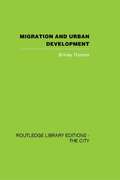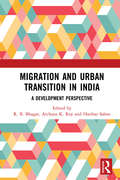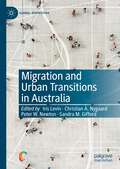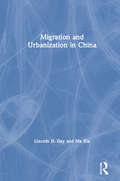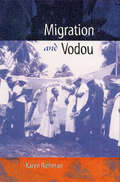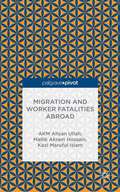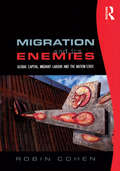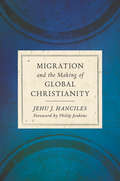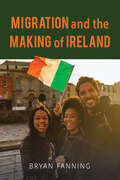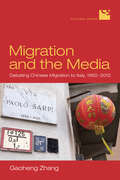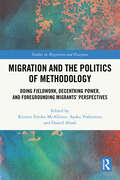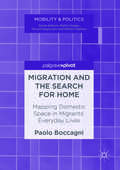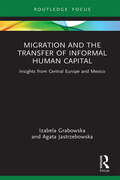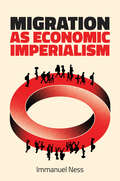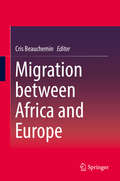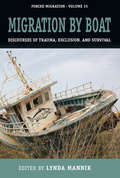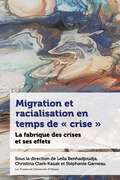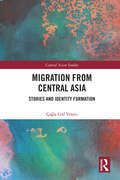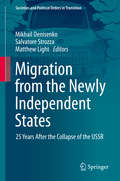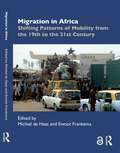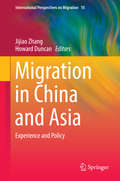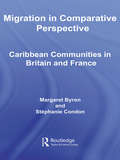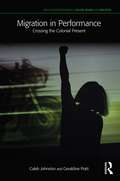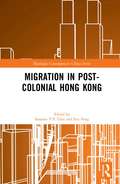- Table View
- List View
Migration and Urban Development
by Brinley ThomasThis book provides a fascinating insight into the development of the nineteenth century Atlantic economy and the nature of contemporary migration. In particular the author argues that the assumption that the United States economy was the unmoved mover in the fluctuations of the international economy between 1860 and 1913 is incorrect. He presents evidence on regional housebuilding cycles in nineteenth-century Britain and shows that the British cycle was inverse to the American, and that both were primarily determined by demographic factors. From the mid-nineteenth century, Professor Thomas concludes, the countries of new settlement - America, Canada, Argentina and Australia - experienced long swings in urban development opposite in timing to those in Britain, the principal suppliers of funds. The result was a converse pattern of capital formation and export upsurges in Britain and her overseas borrowers. This book was first published in 1972.
Migration and Urban Transition in India: A Development Perspective
by R. B. Bhagat Archana K. Roy Harihar SahooMigration has emerged as an important issue in contemporary global politics and in the discourse around human development. This book highlights the role of migration in socioeconomic development and its interdependence with urbanization, employment, labour and industry. This volume identifies the challenges which migration and the subsequent dynamism in population and spatial parameters pose to land-use patterns, ecology, social politics and international relations. Through a study of migration patterns and trends in different parts of India, this collection analyzes the relationship of migration with social and occupational mobility, poverty and wealth indices, inequality, distribution of resources and demographic change. It also explores policy measures and frameworks which can bring migration into the fold of national development strategies. Timely and comprehensive, the book underscores the importance of migration and urbanization, sustainability and inclusivity to economic growth and development. It will be an essential read for scholars and researchers of migration studies, political studies, sociology, urban studies, development studies and political sociology.
Migration and Urban Transitions in Australia (Global Diversities)
by Iris Levin Christian A. Nygaard Peter W. Newton Sandra M. GiffordThis book offers a critical reflection on the ways in which migration has shaped Australia’s cities, especially over the past twenty years. Australian cities are among the world’s most culturally diverse and are home to most of the nation’s population. This edited collection brings together contemporary research carried out by scholars across a range of diverse disciplines, all of whom are concerned with the intersections between migration and urban change. The chapters are organised under three sections: demographic, settlement and environmental transitions; urban form and housing transitions; and socio-cultural transitions. Drawing on diverse theoretical and methodological approaches, the chapters engage with a range of factors and influences affecting migration and urban development. This book will be of special interest to scholars and practitioners in the disciplines of sociology, urban planning, geography, public policy and environmental sustainability.
Migration and Urbanization in China
by Lincoln H. Day Ma XiaBased upon an analysis of a national survey of migration conducted in late 1986 by the Chinese Academy of Social Sciences, this book provides analyses of the volume and direction of movement, the characteristics and motivation of those who move, and the consequences of their moving.
Migration and Vodou (New World Diasporas)
by Karen E. RichmanThis book and accompanying compact disc provide a rare excursion in the innovative ways a community of Haitian migrants to South Florida has maintained religious traditions and familial connections. It demonstrates how religion, ritual, and aesthetic practices affect lives on both sides of the Caribbean, and it debunks myths of exotic and primitive vodou (often spelled "voodoo"), which have long been used against Haitians. As Karen Richman shows, Haitians at home and in migrant settlements make ingenious use of audio and video tapes to extend the boundaries of their ritual spaces and to reinforce their moral and spiritual anchors to one another. The book and CD were produced in collaboration to give the reader intimate access to this new expressive media. Sacred songs are recorded on tapes and circulated among the communities. Migrants are able to hear not only the performance sounds--drumming, singing, and chatter--but also a description, as narrators tell of offerings, sacrifices, prayers, and the exchange of possessions. Spirits who inhabit the bodies of ritual actors are aware of the recording devices and personally address the absent migrants, sometimes warning them of their financial obligations to family members in Haiti. The migrants’ dependence on their home village is dramatically reinforced while their economic independence is restricted. Using standard ethnographic methods, Richman’s work illuminates the connections among social organization, power, production, ritual, and aesthetics. With its transnational perspective, it shows how labor migration has become one of Haiti’s chief economic exports. A volume in the series New World Diasporas, edited by Kevin A. Yelvington
Migration and Worker Fatalities Abroad
by Akm Ahsan Ullah Mallik Akram Hossain Kazi Maruful IslamThis book investigates the alarming of fatalities among migrant workers. The authors argue that migrant workers are often powerless and unprotected by national laws, unearthing new truths on migrant workers as significant economic players.
Migration and its Enemies: Global Capital, Migrant Labour and the Nation-State (Research In Migration And Ethnic Relations Ser.)
by Robin CohenCan politicians effectively control national borders even if they wish to do so? How do politically powerless migrants relate to more privileged migrants and to national citizens? Is it possible for capital to move to labour rather than vice versa? In this book Robin Cohen shows how the preferences, interests and actions of the three major social actors in international migration policy - global capital, migrant labour and national politicians - intersect and often contradict each other. Cohen addresses these vital questions in a wide-ranging, lucid and accessible account of the historical origins and contemporary dynamics of global migration.
Migration and the Making of Global Christianity
by Jehu J. HancilesA magisterial sweep through 1500 years of Christian history with a groundbreaking focus on the missionary role of migrants in its spread. Human migration has long been identified as a driving force of historical change. Building on this understanding, Jehu Hanciles surveys the history of Christianity&’s global expansion from its origins through 1500 CE to show how migration—more than official missionary activity or imperial designs—played a vital role in making Christianity the world&’s largest religion. Church history has tended to place a premium on political power and institutional forms, thus portraying Christianity as a religion disseminated through official representatives of church and state. But, as Hanciles illustrates, this &“top-down perspective overlooks the multifarious array of social movements, cultural processes, ordinary experiences, and non-elite activities and decisions that contribute immensely to religious encounter and exchange.&” Hanciles&’s socio-historical approach to understanding the growth of Christianity as a world religion disrupts the narrative of Western preeminence, while honoring and making sense of the diversity of religious expression that has characterized the world Christian movement for two millennia. In turning the focus of the story away from powerful empires and heroic missionaries, Migration and the Making of Global Christianity instead tells the more truthful story of how every Christian migrant is a vessel for the spread of the Christian faith in our deeply interconnected world.
Migration and the Making of Ireland
by Bryan FanningIreland has been shaped by centuries of emigration as millions escaped poverty, famine, religious persecution, and war. But what happens when we reconsider this well-worn history by exploring the ways Ireland has also been shaped by immigration?From slave markets in Viking Dublin to social media use by modern asylum seekers, Migration and the Making of Ireland identifies the political, religious, and cultural factors that have influenced immigration to Ireland over the span of four centuries. A senior scholar of migration and social policy, Bryan Fanning offers a rich understanding of the lived experiences of immigrants. Using firsthand accounts of those who navigate citizenship entitlements, gender rights, and religious and cultural differences in Ireland, Fanning reveals a key yet understudied aspect of Irish history. Engaging and eloquent, Migration and the Making of Ireland provides long overdue consideration to those who made new lives in Ireland even as they made Ireland new.
Migration and the Media: Debating Chinese Migration to Italy, 1992–2012 (Cultural Spaces)
by Gaoheng ZhangThe first book to analyze cultural dynamics of Chinese migration to Italy between 1992 and 2012, Migration and the Media compares Italian, Chinese migrant, and international media interpretations. During this twenty-year period, the media covered this migration extensively, revealing the eye-opening characteristics of Italy’s Chinese community. Gaoheng Zhang places the strong media interest in Italian-Chinese migrant relations within relevant economic, political, cultural, and linguistic contexts. Examining how journalists, entrepreneurs, and politicians debated Italy’s Chinese, Zhang argues that these stakeholders viewed the migration as a particularly effective example to support or dispute Italy’s general stance toward migrant integration and economic globalization. Zhang also proposes that an Italian-Chinese migrant cultural repertoire offered the stakeholders resources to cover the migration.
Migration and the New Technological Borders of Europe
by Huub Dijstelbloem Albert MeijerEuropean borders that aim to control migration and mobility increasingly rely on technology to distinguish between citizens and aliens. This book explores new tensions in Europe between states and citizens, and between politics, technology and human rights.
Migration and the Politics of Methodology: Doing Fieldwork, Decentring Power, and Foregrounding Migrants’ Perspectives (Studies in Migration and Diaspora)
by Kirsten Emiko McAllister Ayaka Yoshimizu Daniel AhadiThis volume examines the politics of fieldwork and the challenges of researching migrants constructed as outsiders both nationally and transnationally. Based on research with undocumented migrants, temporary workers, refugees, international students, and those who, having received citizenship status find their lives to be discursively and legally restricted, it shows how interdisciplinary fieldwork-based approaches can provide detailed accounts of migrants’ voices and their conditions of existence, offering insights into the ways in which they understand and take part in producing their transnational worlds. Applying critical, self-reflexive methodological approaches that challenge assumptions about who has the authority to produce knowledge and what types of knowledge have the authority of truth, Migration and the Politics of Methodology will appeal to scholars of sociology, anthropology, geography, and communication and cultural studies with interests in research methods and migration.
Migration and the Search for Home
by Paolo BoccagniThis book explores the impact of transnational migration on the views, feelings, and practices of home among migrants. Home is usually perceived as what placidly lies in the background of everyday life, yet migrants' experience tells a different story: what happens to the notion of home, once migrants move far away from their "natural" bases and search for new ones, often under marginalized living conditions? The author analyzes in how far migrants' sense of home relies on a dwelling place, intimate relationships, memories of the past, and aspirations for the future-and what difference these factors make in practice. Analyzing their claims, conflicts, and dilemmas, this book showcases how in the migrants' case, the sense of home turns from an apparently intimate and domestic concern into a major public question.
Migration and the Transfer of Informal Human Capital: Insights from Central Europe and Mexico (Routledge Studies in Development, Mobilities and Migration)
by Izabela Grabowska Agata JastrzebowskaThis book explores the intangible human capital which international migrants bring with them and develop further when working and living abroad, drawing on case studies and original data from Central Europe and Mexico–USA. The book demonstrates that despite the fact that many international migrants might be working in their destination countries at a level below their formal qualifications, or else might be formally unskilled, but with practical non-validated skills, they can still acquire and enhance considerable informal human capital in the form of mind skills, soft skills, maker skills and life skills. The book analyses how migration-impacted informal human capital (MigCap) is acquired and enhanced as a result of international migration and what the opportunity and constraint structures are for their acquisitions and transfers. Adopting a comprehensive perspective, the book investigates how migration-impacted informal human capital is transferred by migrants between localities and areas of human actions and activities. Moving beyond the focus on migration as a source of economic capital, this book demonstrates that learning by observing, communicating and doing with others, embedded in social relations can facilitate the enhancement of intangible human capital among both skilled and unskilled migrants. It will be of interest to researchers of migration, sociology, economics, management and business studies, and other related social science disciplines.
Migration as Economic Imperialism: How International Labour Mobility Undermines Economic Development in Poor Countries
by Immanuel NessFor several decades, wealthy states, international development agencies and multinational corporations have encouraged labour migration from the Global South to the Global North. As well as providing essential workers to support the transformation of advanced economies, the remittances that migrants send home have been touted as the most promising means of national development for poor and undeveloped countries. As Immanuel Ness argues in this sharp corrective to conventional wisdom, temporary labour migration represents the most recent form of economic imperialism and global domination. A closer look at the economic and social evidence demonstrates that remittances deepen economic exploitation, unravel societal stability and significantly expand economic inequality between poor and rich societies. The book exposes the damaging political, economic and social effects of migration on origin countries in Africa, Asia and Latin America, and how border and security mechanisms control and marginalize low-wage migrant workers, especially women and youth. Ness asserts that remittances do not bring growth to poor countries but extend national dependence on the export of migrant workers, leading to warped and unequal development on the global periphery. This expert take will be a valuable resource for students and scholars of migration and development across the social sciences.
Migration between Africa and Europe
by Cris BeaucheminThis volume examines migration between Africa and Europe, rather than just from Africa to Europe. Based on a unique socio-demographic survey carried out both in origin and destination countries (MAFE survey), it argues that return migration, circulation, and transnational practices are significant. Policy design must also take these factors into account.Comparing in a systematic way three flows of African migrants (from Democratic Republic of Congo, Ghana and Senegal), this study offers a new view on the patterns, determinants, and family and economic effects of migration. By comparing six European countries (Belgium, France, Italy, the Netherlands, Spain and the UK), it shows that the dynamics of migration differ greatly in new vs. old destination countries. Based on a statistical analysis of life histories, this study provides a dynamic view of migration that will help readers better understand current trends as well as future trajectories. It will appeal to researchers, academics, practitioners, and others interested in taking a deeper look in (im)migration issues.
Migration by Boat: Discourses of Trauma, Exclusion and Survival
by Lynda MannikAt a time when thousands of refugees risk their lives undertaking perilous journeys by boat across the Mediterranean, this multidisciplinary volume could not be more pertinent. It offers various contemporary case studies of boat migrations undertaken by asylum seekers and refugees around the globe and shows that boats not only move people and cultural capital between places, but also fuel cultural fantasies, dreams of adventure and hope, along with fears of invasion and terrorism. The ambiguous nature of memories, media representations and popular culture productions are highlighted throughout in order to address negative stereotypes and conversely, humanize the individuals involved.
Migration et racialisation en temps de « crise »: La fabrique des crises et ses effets (Études en développement international et mondialisation)
by Christina Clark-Kazak Stéphanie Garneau Leila BenhadjoudjaCrise sanitaire, crise migratoire, crise humanitaire, crise climatique… Le renvoi répété à l’idée de crise pour désigner nombre de bouleversements sociaux laisse à penser que nous vivons désormais dans un monde « crisogène ».Or, l’urgence inhérente à l’idée de crise conduit souvent à légitimer la violation des droits et le renforcement de la surveillance, du profilage et des arrestations arbitraires, rendant visible le contrôle qu’exerce l’État sur les corps, et surtout sur certains corps.Migration et racialisation en temps de « crise » explore les ressorts coloniaux, racistes et sexistes au fondement de diverses déclarations de crise, ainsi que leurs effets. L’ensemble des contributions montre que l’état de crise apparaît comme une condition pour le maintien d’un capitalisme racial et patriarcal.
Migration from Central Asia: Stories and Identity Formation (Central Asian Studies #43)
by Çağla Gül YeseviMigration from Central Asia analyzes migration from Turkestan to Türkiye, Saudi Arabia, and the United States and the identity formation of these people living in different countries. It also deals with younger generations and their views about homeland, sense of belonging, and identity. Using oral history methods, the book focuses on migrants from Turkestan in the 1930s. The book includes in-depth interviews as well as short surveys with those who migrated and their children. Focusing on what families experienced during migration, how they made their living, how they lived in these different countries, and how they preserved their language, traditions, and culture, the author presents an overall picture of these migrants and how and why language and traditions, which are central cultural elements, have been preserved. The analysis in this book contextualizes the change in the structure of migration and identity formation and the emergence of the notion of Turkestanian migrants. It will be of interest to academics studying Turkish World Studies, Central Asian Studies, and migration studies as well as identity and cultural studies, ethnic studies, and nationalism.
Migration from the Newly Independent States: 25 Years After the Collapse of the USSR (Societies and Political Orders in Transition)
by Matthew Light Mikhail Denisenko Salvatore StrozzaThis book discusses international migration in the newly independent states after the collapse of the Soviet Union, which involved millions of people. Written by authors from 15 countries, it summarizes the population movement over the post-Soviet territories, both within the newly independent states and in other countries over the past 25 years. It focuses on the volume of migration flows, the number and socio-demographic characteristics of migrants, migration factors and the situation of migrants in receiving countries. The authors, who include demographers, economists, geographers, anthropologists, sociologists and political scientists, used various methods and sources of information, such as censuses, administrative statistics, the results of mass sample surveys and in-depth interviews. This heterogeneity highlights the multifaceted nature of the topic of migration movements.
Migration in Africa: Shifting Patterns of Mobility from the 19th to the 21st Century
by Michiel De HaasThis book introduces readers to the age of intra-African migration, a period from the mid-19th century onward in which the center of gravity of African migration moved decisively inward. Most books tend to zoom in on Africa’s external migration during the earlier intercontinental slave trades and the more recent outmigration to the Global North, but this book argues that migration within the continent has been far more central to the lives of Africans over the course of the last two centuries. The book demonstrates that only by taking a broad historical and continent-wide perspective can we understand the distinctions between the more immediate drivers of migration and deeper patterns of change over time. During the 19th century Africa’s external slave trades gradually declined, whilst Africa’s expanding commodity export sectors drew in domestic labor. This led to an era of heightened mobility within the region, marked by rapidly rising and vanishing migratory flows, increasingly diversified landscapes of migration systems, and profound long-term shifts in the wider patterns of migration. This era of inward-focused mobility reduced with a resurgence of outmigration after 1960, when Africans became more deliberate in search of extra-continental destinations, with new diaspora communities emerging specifically in the Global North. Broad ranging in its temporal, spatial, and thematic coverage, this book provides students and researchers with the perfect introduction to age of intra-African migration.
Migration in China and Asia
by Jijiao Zhang Howard DuncanThis book will enlarge our grasp of global migration phenomena, offering insights into the fascinating, at times startling, realities of human migration in Asia. The chapters presented in this volume offer variety in not only theme but in approach to migration in Southeast and East Asia. Particularly welcome for a volume on migration studies, a discipline that has long been dominated by economists, sociologists, and geographers, are the chapters that approach the subject from an anthropological or ethnological perspective. These chapters bring to our attention details of the lives of migrants and their communities that are often lost in studies of migration statistics, the economic aspects of migration, or aspects of urban geography with which we have become more familiar. Some chapters are more theoretical in nature and herein lie some of the most important reasons for studying migration involving Asian countries: migration studies have, until relatively recently, developed their theoretical insights on the basis of European migration to North America. Asian migration offers new theoretical challenges to migration scholars; its dynamism is such that predictions of what is to come are not for the risk averse. The empirical studies here provide fascinating details of the strategies used by asylum seekers, of marriage migration, of the role of homeland languages in education, of the workings of ethnic entrepreneurs, of the media's role in sustaining Chinese communities, and on the incentive structures that are helping to shape return flows to China. For readers who are from Asian countries, this book will illuminate the changes that are taking place in your region as a result of migration. For readers from developed and other societies, it will provide new insights into migration involving this understudied part of the world, an area that supplies the lion's share of immigrants to developed economies, and the area whose rapid economic development will soon make it their greatest competition for migrants, especially the highly skilled.
Migration in Comparative Perspective: Caribbean Communities in Britain and France (Routledge Research in Population and Migration)
by Margaret Byron Stéphanie CondonThis book presents a comparative perspective on post-war Caribbean migration to Britain and France. Both migrations were responses to the link between former colonies and colonial powers. However, the movements of labor occurred within separately and differently evolving political contexts, affecting the migration outcomes. Today, Caribbean communities in Europe display complex features of continuity and change. Condon and Byron examine trends in migration patterns, household and family structures, social fields, employment and housing trajectories in detail. This systematic comparison with its innovative focus on gender and life-course, is an excellent addition to the existing literature on the Caribbean diaspora.
Migration in Performance: Crossing the Colonial Present (Routledge Research in Place, Space and Politics)
by Geraldine Pratt Caleb JohnstonThis book follows the travels of Nanay, a testimonial theatre play developed from research with migrant domestic workers in Canada, as it was recreated and restaged in different places around the globe. This work examines how Canadian migration policy is embedded across and within histories of colonialism in the Philippines and settler colonialism in Canada. Translations between scholarship and performance – and between Canada and the Philippines – became more uneasy as the play travelled internationally, raising pressing questions of how decolonial collaborations might take shape in practice. This book examines the strengths and limits of existing framings of Filipina migration and offers rich ideas of how care – the care of children and elderly and each other – might be rethought in radically new ways within less violently unequal relations that span different colonial histories and complex triangulations of racialised migrants, settlers and Indigenous peoples. This book is a journey towards a new way of doing and performing research and theory. It is part of a growing interdisciplinary exchange between the performing arts and social sciences and will appeal to researchers and students within human geography and performance studies, and those working on migration, colonialisms, documentary theatre and social reproduction.
Migration in Post-Colonial Hong Kong (Routledge Contemporary China Series)
by Susanne Y.P. Choi Eric FongSince 1995 most mainland migrants to Hong Kong have been the wives or non-adult children of Hong Kong men of lower socio-economic status. The majority of immigrants are women, who throughout the past two decades have accounted for more than 60% of immigration. The profile of immigrants has been changing and they are significantly more educated than was the case in the past. Despite the improvement in the educational level of mainland Chinese migrants since 1991, and their increased involvement in paid employment, migrants have continued to experience great difficulty integrating into Hong Kong society and anti-immigrant sentiment seems to have increased over the same period. This raises the question of how gender and socio-economic factors intersect with migration to influence the extent of migrants’ adaption to Hong Kong society and culture. The growing anti-China sentiment in Hong Kong also raises the question of how the integration of migrants into a destination society is influenced by the political context. Examining the questions around migration into Hong Kong from a range of multidisciplinary perspectives, this book combines quantitative and qualitative data to portray a detailed image of contemporary Hong Kong.
